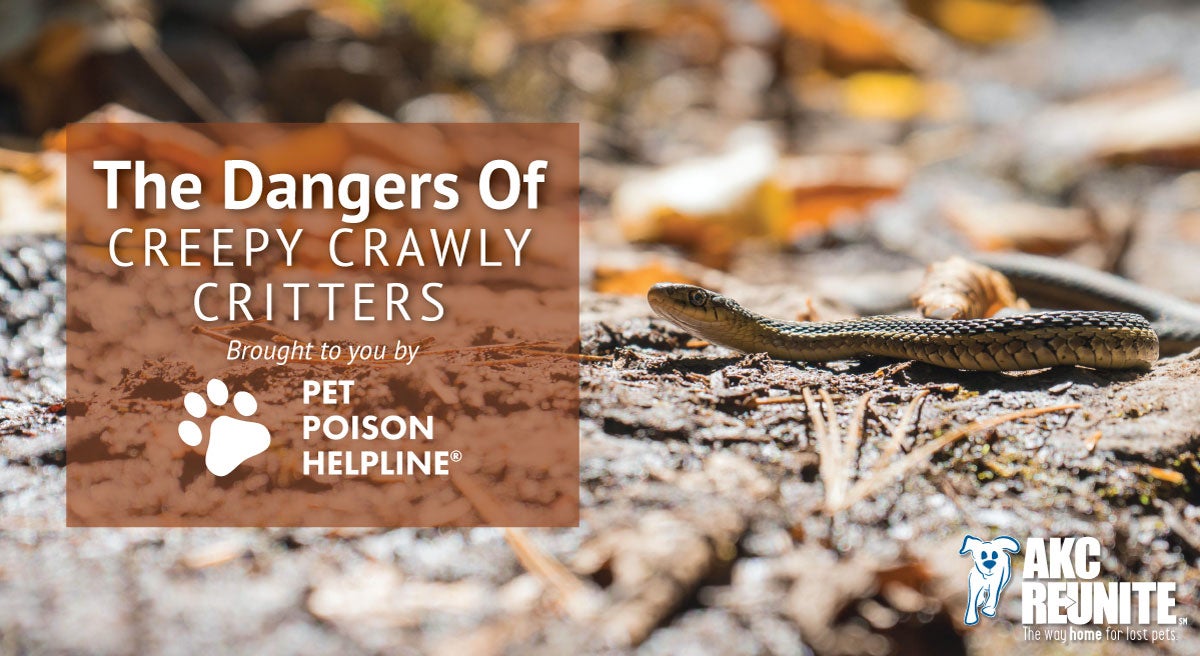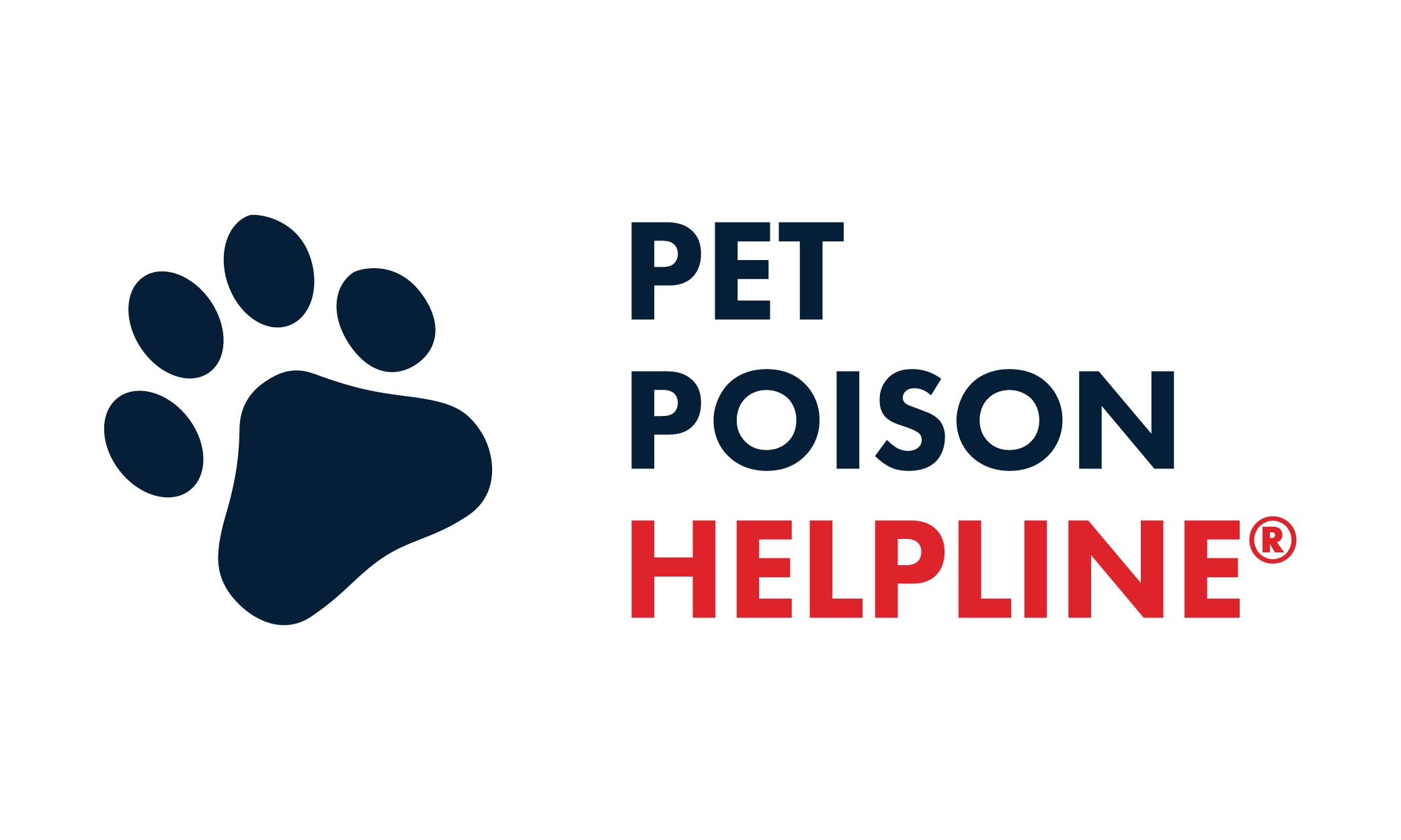Brought to you by Pet Poison Helpline & AKC Reunite
Enjoying the outdoors with your pet can be a fantastic bonding experience and a great way to keep them active. However, many pets are very curious in nature and have a strong drive to check out any animal slithering, sliding, or hopping by. Some of these animals can pose a serious risk to your pet’s health. Owner recognition is the first line of defense when it comes to protecting your animal while you experience the great outdoors together.
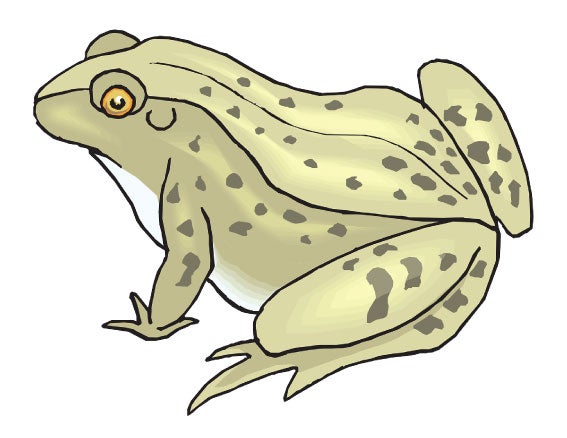
TOADS
Certain species of toads can be very poisonous to pets, including the Sonoran Desert or Colorado River toad (Incilius alvarius; formerly known as Bufo alvarius) and the Marine or Cane toad (Rhinella marinus; formerly known as Bufo marinus). These toads are very large in size, often reaching 8 or 9 inches when mature and are typically only found in certain parts of North America, including the region between Arizona and California and in Florida, Texas, Hawaii, and other tropical areas (respectively). The Marine toad is considered to be more poisonous, and most dogs poisoned by these toads will die if untreated. Just holding the toad in the mouth can result in poisoning and death. Dogs can even be poisoned by drinking the water out of the container that a toad sat in.
Poisoning is due to toxins called bufotoxins and bufodienolides and biogenic amines found in the toad’s parotid glands and skin. Mouthing, chewing or otherwise playing with the toad causes compression of the glands and secretion of the poison. Contact with the mucous membranes or ingestion can result in severe, immediate drooling, followed by an elevated temperature, brick red mucous membranes, abnormal heart rhythms, difficulty breathing, seizures, and even death.
SNAKES
There are four main species of concern when it comes to venomous snakes: Rattlesnakes, Copperhead Snakes, Cottonmouth Snakes, and Coral Snakes. Rattlesnake species are native in every state except Alaska and Maine and each type is capable of significant envenomation. The venom toxicity is highly variable depending on the species of Rattlesnake and the geographic variation in venom profiles. Clinical signs commonly associated with Rattlesnake bites include airway obstruction, skin swelling at the site of the bite, drooling, weakness, seizures, respiratory distress, diarrhea, and vomiting. The most effective treatment for Rattlesnake bites is antivenom.
Copperhead and Cottonmouth Snakes are both pit vipers and are located throughout the USA. Copperhead and Cottonmouth envenomation’s produce very similar clinical signs to that of a Rattlesnake bite, but in general, are not as severe as those associated with Rattlesnake envenomation. However, local bite wound affects can be quite significant. Treatment for these bites also involves the use of antivenom. Coral snakes are found in southeastern USA and are poisonous to all animals, especially cats. Their venom contains neurotoxins that affect neuromuscular junctions resulting in drooling, incoordination, disorientation, respiratory distress, and paralysis. The best treatment is antivenom administered by a veterinarian.
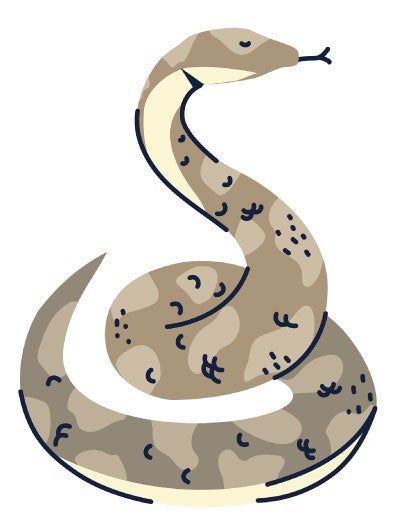
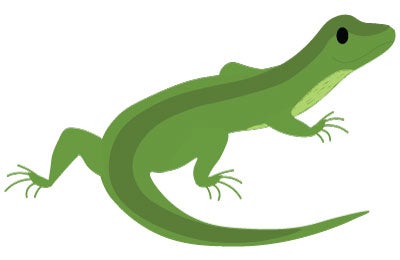
NEWTS
These slimy creatures can cause serious health risks if consumed or chewed on by your pet. Not all newts are harmful to household pets and farm animals, but there are two newt species that can be particularly dangerous upon ingestion. The Red-Spotted Newt located in eastern USA and the Rough-Skinned Newt located north of Francisco Bay, California can both secrete tetrodotoxin. Tetrodotoxin is an extremely potent poison found in the white fluid-like secretions that these newts exude. Consumption of either of these newt species can lead to progressive muscle paralysis, respiratory distress, and seizures. Treatment typically involves rinsing the mouth, supportive measures provided by a veterinarian, and possible surgical removal of the newt if completely consumed.
FLATWORMS
Flatworms are commonly referred to as Hammerhead worms and are an invasive species from Southeast Asia that have spread across the USA. These worms are frequently found in suburban areas and garden centers where exotic plants are in abundance. Similar to newts, they also secrete the potent poison tetrodotoxin. However, many flatworms need to be consumed before posing a significant toxicity effect on your pet’s health.
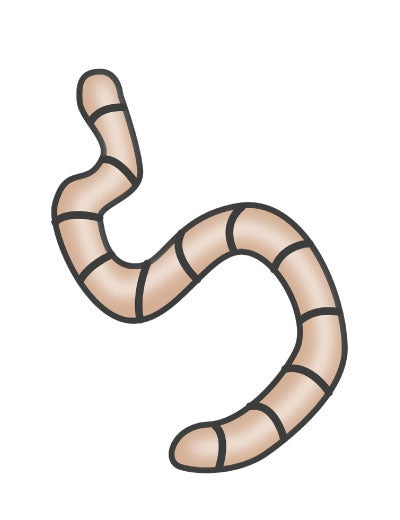
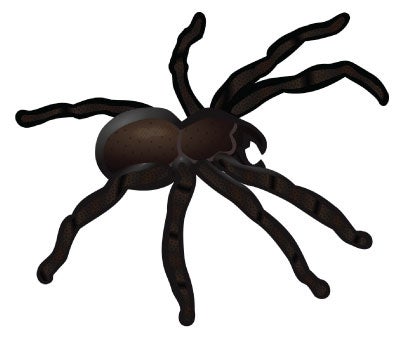
SPIDERS
Spiders can create a serious health risk for your pet if they are bitten by a venomous species. Luckily, most spider species are minimally or non-venomous! However, species to be aware of are the female Black Widow located throughout North America, the female Brown Widow located in southern and western USA, and the Brown Recluse spider located in southern USA.
Female Black and Brown Widows can be very dangerous, because they have prominent venom glands and can deliver a large venom dose with their bite. The male spiders of this species rarely inflict significant venom with their bites due to their smaller fang size and the inability to effectively penetrate the skin barrier of humans and animals. If bitten by a female Widow spider, common clinical signs include muscle pain and redness at the site of the bite, weakness, tremors, seizures, and respiratory distress. Treatment for Widow spider bites includes anti-venom and supportive care provided by a veterinarian.
There is a large range of variability when it comes to envenomation from the Brown Recluse spider, also known as the violin spider. The majority of bites from this species are insignificant, however the presence of clinical signs indicates significant envenomation. If significant envenomation has occurred, common clinical signs include skin necrosis at the site of the bite, fever, vomiting, and weakness. There is no antidote for Brown Recluse spider bites, but treatment includes fluid therapy and supportive care provided by a veterinarian.
Be aware of the creepy crawly critters in your local area or anywhere that you may travel to with your pet. To help reduce the risk of an unfortunate encounter you should closely monitor your pet while it is outdoors, always keep your pet on a leash, and reduce any nose-to-nose contact your pet has with other outdoor animals. If your pet does come into contact with one of these species, take action immediately and seek veterinary help or contact Pet Poison Helpline immediately.
Pet Poison Helpline is a 24/7 animal poison control service available for pet owners and veterinary professionals who require assistance with treating a potentially poisoned pet. Pet Poison Helpline has the ability to help every poisoned pet, with all types of poisonings. Normally $85 per incident, with AKC Reunite you can plan ahead and subscribe your pet to this life-saving service for only $15 for the lifetime of your pet.
Should your pet ingest something potentially poisonous, contact AKC Reunite at 800-252-7894 and we will verify your membership and connect you to a toxicology expert to help you and your pet FAST.

